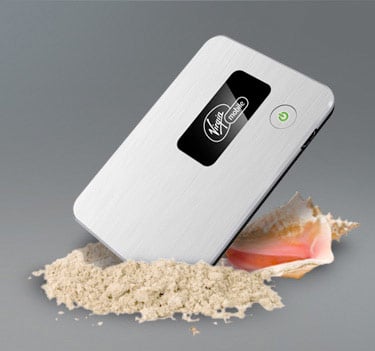Virgin Mobile USA Marks Return Of $20, Contract-Free WWAN Plan
by Ray Willington
from http://hothardware.com/
It's back! No, not the McRib, Virgin Mobile USA's $20 no-contract broadband plan! The company has just announced a new expansion to their Broadband2Go offerings, with the triumphant return of the $20 plan leading the charge. This joins the current $10 and $50 plans, and provides 500MB with one month expiration for $20, offering another option for flexible internet access especially for the occasional user or traveler. Virgin Mobile’s no contract Broadband2Go plans feature 3G speeds and start at just $10 for 10 days/100MB of access. For heavy users the $50 plan offers unlimited data access with 3G speeds up to 2.5GB each month.
For clarity, all of these devices operate on Sprint's network, so you'll need to double-check Sprint coverage near you before buying in. You'll also get a number of device options, all spelled out below. In a world of tie-me-downs, hearing this news feels really refreshing.

WARREN, N.J. – May 19, 2011 – Virgin Mobile USA continues to enhance its affordable, No Contract offerings for mobile broadband with the addition of a $20 plan to its Broadband2Go portfolio. Now available online and at participating retailers, the new plan, an addition to the current $10 and $50 plans, provides 500MB of data with a one-month expiration, offering another option for flexible Internet access, especially for the occasional user or traveler.
“From business travelers to virtual workers to students, consumers use Broadband2Go in different ways,” said Sean Yelle, product manager, Virgin Mobile USA. “We found there are a substantial number of customers who want a monthly plan, but don’t need unlimited data. The addition of our new $20/500MB plan, paired with no annual contracts, provides customers an affordable option for broadband access, allowing them to pay only for the service they need, when they need it.”
Virgin Mobile’s No Contract Broadband2Go plans feature 3G speeds and start at just $10 for 10 days/100MB of access. For heavy users the $50 plan offers unlimited data access with 3G speeds up to 2.5GB each month. Additionally, Walmart customers will still be offered the $20 plan for 1GB of monthly access.
Virgin Mobile offers three different mobile broadband devices, operating on the Sprint Nationwide Network, as part of the Broadband2Go device portfolio:
* The Ovation™ MC760 USB device, developed in conjunction with Novatel® Wireless (Nasdaq: NVTL), connects to a single personal computer or laptop and is available at retail for $79.99
* The MiFi® 2200, an Intelligent Mobile Hotspot developed in conjunction with Novatel Wireless, is priced at $149.99 and allows up to five users at a time to connect using a variety of Wi-Fi enabled devices; and,
* The ZTE PEELTM 3200, a first-of-its-kind device that connects to your iPod Touch® (second and third generations) for access to the Internet, email, music and more –for $99.99. The exclusive broadband plan for the PEEL 3200 offers users 500MB of data for $20/month.










